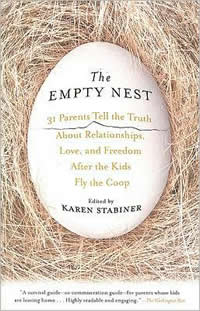Book Notes
 Karen Stabiner, The Empty Nest; 31 Parents Tell the Truth About Relationships, Love, and Freedom After the Kids Fly the Coop (New York: Voice-Hyperion, 2007), 302pp.
Karen Stabiner, The Empty Nest; 31 Parents Tell the Truth About Relationships, Love, and Freedom After the Kids Fly the Coop (New York: Voice-Hyperion, 2007), 302pp.
I have to admit that on several visits to our public library, I saw this book on display. One time I thumbed through it, and on several occasions I almost checked it out. But I never did; maybe it was fear or denial, but I didn't look forward to "losing" the last of our three kids to college. A few weeks later our youngest of three children graduated from high school, signaling that our own empty nest was imminent. And then at the commencement exercises — voila! — a good friend handed me the book as a graduation present. I was glad that she did, and I was glad that I read about the experiences of other parents.
Standard wisdom suggests that two of the most stressful junctures of any marriage are when the first child arrives and when the last child leaves. But as these parent-authors show, in the best circumstances, the departure of your youngest child to college can be yet another thread in the rich tapestry of life. Bittersweet, yes, but also richly rewarding. It's a tremendous paradox, too. Is there any other job, asks Ellen Goodman, that defines success as making yourself unnecessary? Our goal as parents, after all, is to raise our kids to leave us, and if they don't, then in some measure we have failed. When our first two kids in college came home for holidays, upon their return trip to school I would ask them, "does returning to college feel like you are leaving home or returning home?" At some point they transitioned, and leaving their family meant returning to their new home of college friends. That was hard to hear as a parent, maybe, but just what you wanted to hear, too.
Most of these essays are written by mothers (24 of the 31 chapters). I appreciated the life wisdom of those parents who were further down the road and had gained more perspective and distance from the early traumas of emptying the nest. I especially appreciated reading how there are many different ways to experience healthy family dynamics. Stabiner does a good job of collecting stories from widely different perspectives — gay and straight, single dads and moms, Cuban and black parents, grandparents, families that appear more healthy and whole and others that have experienced deep heartaches and tragedies. Reading these stories helped to demystify my fear of the unknown, and to help me realize that whatever losses the empty nest bring, there are also unique joys ahead.


